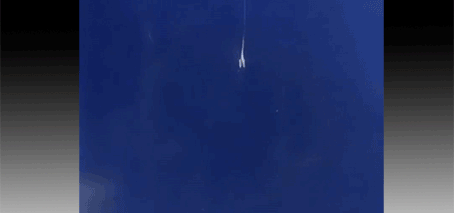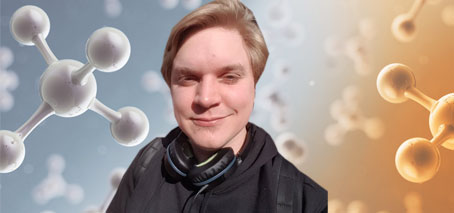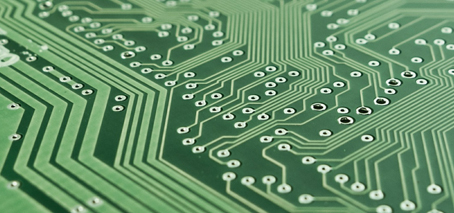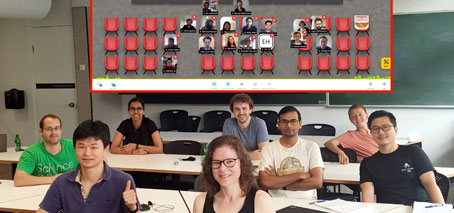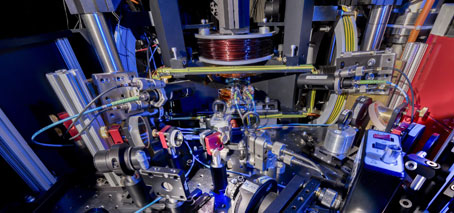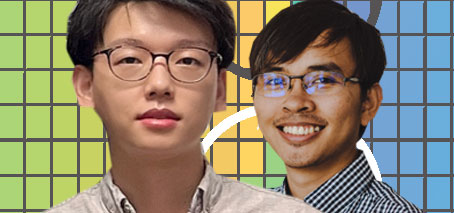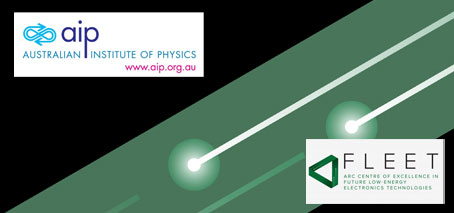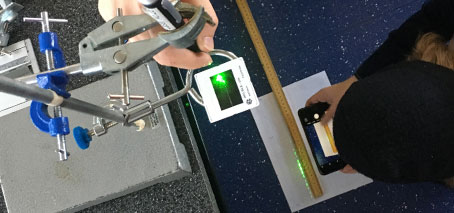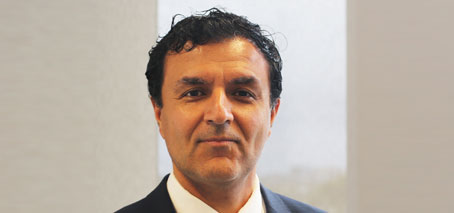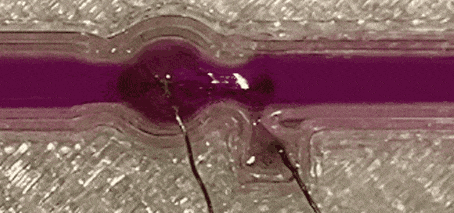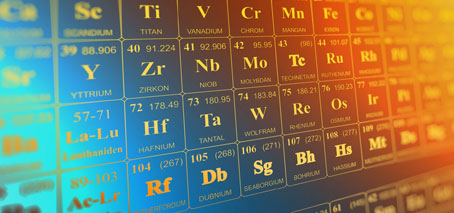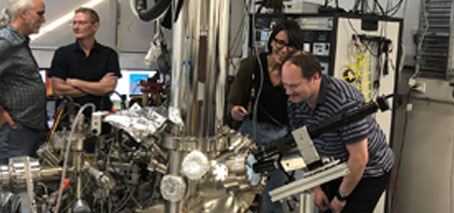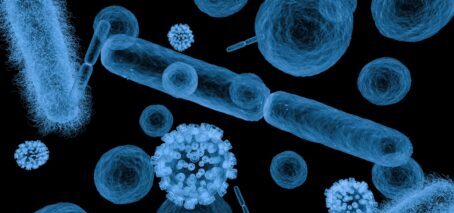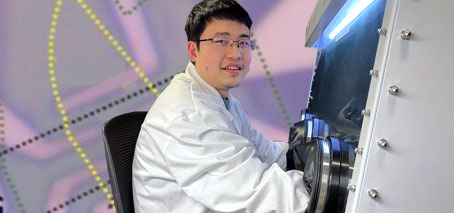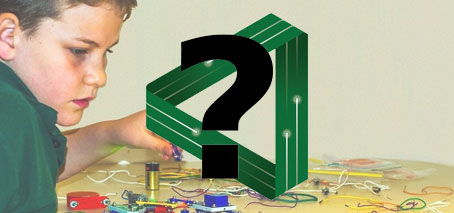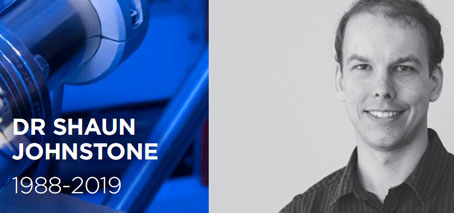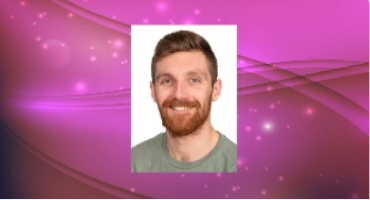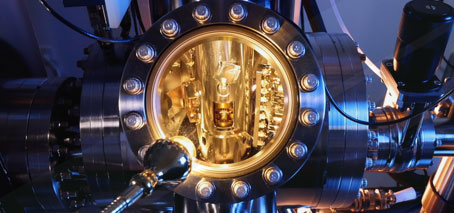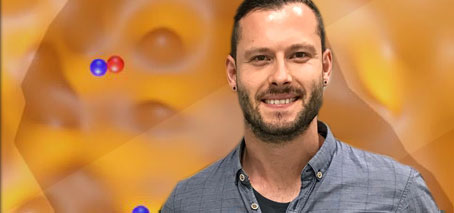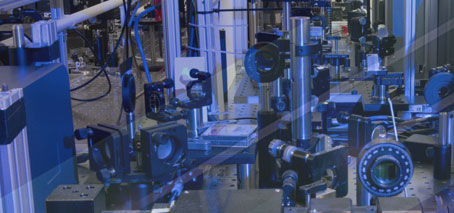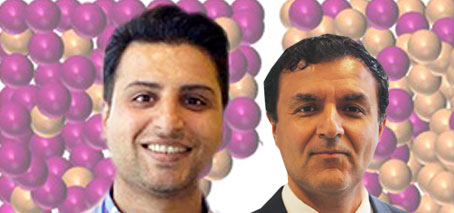In a landmark discovery, FLEET University of Wollongong (UOW) researchers have realised the non-contact manipulation of liquid metal. The metals can be controlled to move in any direction, and manipulated into unique, levitated shapes such as loops and squares by using a small voltage and a magnet. The liquid metal used is galinstan, an alloy of gallium, indium and tin, …
Top FLEET hits online in 2021
What FLEET content has caught the attention of the digital world in 2021? FLEET’s digital presence spans a handful of social media platforms, the FLEET research blog, and posts on external sites such as Phys.org, Eurekalert, Science Daily, Nanowerk, Materials Australia, New Electronics, Semiconductor Digest and AZO Materials. Top hits in 2021 included: • YouTube Wolfgang Ketterle FLEET talk on …
Where are they now? FLEET alum Carlos Kuhn
Solving complex problems, data analysis to aid decision-making, and outreach: from cold-atoms research to defence industry consultancy Hi former colleagues from FLEET! I’m Carlos Kuhn. At FLEET, I was a post-doctoral research fellow under the supervision of Prof. Chris Vale at the Centre for Quantum and Optical Science at Swinburne University of Technology, where we investigated non-equilibrium and topological phenomena …
Where are they now? Life post-FLEET: Dr Jesse A. Vaitkus
Job hunting, working in industry, and staying focused on the path forward Hi FLEET, I’m Jesse Vaitkus. I was a PhD student under Prof. Jared H. Cole working on novel transport problems using the Non-Equilibrium Green’s Function (NEGF) method. After graduating I worked on similar problems for him until I left to begin my current job at HQS Quantum Simulations. …
Trapping vortices in thin superfluid films
Physicists at the University of Queensland have shed light upon how tiny whirlpools (vortices) get stuck to obstacles in superfluids. Superfluids are a quantum substance that can flow without viscosity and hence do not slow down due to friction. A second defining feature of superfluids is that they only support quantised rotation – the vortices can only spin with strength …
FLEET2021: online, virtual and in-person
FLEET’s annual workshop is our big opportunity each year to gather together and share research outcomes and progress. FLEET2021 was a ‘hybrid’ affair – with talks and poster online and catch-ups in person, where possible – and was a welcome opportunity to celebrate survival of an difficult year, motivate each other with short research updates and highlights, and catch up …
Negative capacitance in topological transistors could reduce computing’s unsustainable energy load
Australian researchers have discovered that negative capacitance could lower the energy used in electronics and computing, which represents 8% of global electricity demand. The researchers at four universities within the ARC Centre of Excellence in Future Low-Energy Electronics Technologies (FLEET) applied negative capacitance to make topological transistors switch at lower voltage, potentially reducing energy losses by a factor of ten …
Idea Factory 2021
The 2021 Idea Factory challenged 36 early career researchers to write more effective grant applications, and learn to effectively communicate the value of their research to varied audiences. The workshop concentrated on developing researchers’ ability to pitch their research – and get funded, primarily: improving grant writing skills and confidence, customising grants for different funding bodies distilling key messages about …
Congratulations Bao Yue
Congratulations to FLEET Research Fellow Bao Yue Zhang, who received the prestigious 2021 RMIT Vice-Chancellor’s Prize for Research Excellence-HDR, recognised for outstanding research and contributions to novel sensing materials and applications in early cancer diagnosis. “Thanks to my supervisor- Jian Zhen Ou, my current & past mentors…… all my lovely team members, family, friends…..(Sorry I could not name you all) …
Probing quantum gases with spectroscopy (Nature review)
December’s edition of Nature Physics is dedicated to ultracold quantum technologies, including a review of spectroscopic probes of quantum gases by FLEET’s Chris Vale (Swinburne), with MIT’s Martin Zwierlein. Ultracold gases are a laboratory for precision, many-body physics – delivering a wealth of insights into collective quantum phenomena, with direct implications for nuclear and condensed-matter physics. Spectroscopic techniques can probe …
Losing isn’t always bad: gaining topology from loss
Generating topology from loss in hybrid light-matter particles Observation of new non-Hermitian topological invariant in exciton-polariton system Losing particles can lead to positive, robust effects. An international collaboration has demonstrated a novel topology arising from losses in hybrid light-matter particles, introducing a new avenue to induce the highly-prized effects inherent to conventional topological materials, which can potentially revolutionise electronics. Led …
Presenting a feast of FLEET science
There will be a feast of FLEET science in show at the Australian Institute of Physics Summer Meeting (this coming week, 6–9 December) at QUT in Brisbane, with parallel online delivery. The summer meeting will see plenary and keynote talks by FLEET’s Michael Fuhrer, Dimi Culcer and Kirrily Rule, with over 30 presentations by Centre members across six universities. FLEET …
Congratulations
FLEET Chief Investigator Prof Kourosh Kalantar-zadeh has been named in the top 1% by citations in his field (cross field) for the fourth year running. Read more. Congratulations also to FLEET AI Torben Daeneke, whose appointment to Associate Professor at RMIT has just been announced. And to UOW’s Zengji Yue who had been appointed an Associate Investigator within FLEET. FLEET AI Sumeet …
Students confirm benefits of FLEET future-computing unit
Surveying and student interviews confirms success of future computing unit in encouraging girls/other students in physics Over the last three years FLEET has helped put ninety Year 10 students through a ‘Future electronics’ unit, in partnership with John Monash Science School (JMSS). As well as covering semiconductors, Moore’s Law and computing, the course introduces quantum physics at an intuitive level …
Kourosh Kalantar-zadeh top 1%
FLEET Chief Investigator Prof Kourosh Kalantar-zadeh has been named in the top 1% by citations in his field (cross field) for the fourth year running. The Clarivate Analytics list identifies the most influential researchers by citations. The citation identifies influential researchers as determined by their peers around the globe – those who have consistently won recognition in the form of …
No more moving parts: Liquid metal enabled chemical reactors
Liquid-metal machines could wipe out maintenance issues for continuous flow reactors. Metals that are liquid at room temperature, such as gallium and its alloys, are attractive materials due to their unique electrical, thermal and fluidic properties. In a study published today, a research team led by UNSW, Sydney has shown that liquid metals can offer their characteristics to the pharmaceutical and chemical …
Having your cake and eating it too: double-dosing induces magnetism while strengthening electron quantum oscillations in a topological insulator
Harnessing massive Dirac fermions in dual-magnetic-ion-doped Bi2Se3 topological insulator showing extremely strong quantum oscillations in the bulk. Double doping induces a gap for the topological surface state. A University of Wollongong-led team across three FLEET nodes has combined two traditional semiconductor doping methods to achieve new efficiencies in the topological insulator bismuth-selenide (Bi2Se3), Two doping elements were used: samarium (Sm) …
Welcoming Simon Granville (MacDiarmid) new FLEET Partner Investigator
Welcome to FLEET’s long-time collaborator Dr Simon Granville, who this month joins the Centre as a Partner Investigator. Simon is a Principal Investigator at FLEET’s partner organisation the MacDiarmid Institute for Advanced Materials and Nanotechnology, where he leads the Institute’s Future Computing project to control electron transport and spin through superconductivity and topology. As a Senior Scientist at the Robinson …
World record broken for thinnest X-ray detector ever created
Highly sensitive and with a rapid response time, the new X-ray detector is less than 10 nanometres thick and could potentially lead to real-time imaging of cellular biology. Exciton Science and FLEET researchers have used tin mono-sulfide (SnS) nanosheets to create the thinnest X-ray detector ever made, potentially enabling real-time imaging of cellular biology. X-ray detectors are tools that allow …
Quantifying spin in WTe2 for future spintronics
Spin-momentum locking induced anisotropic magnetoresistance in monolayer WTe2 Determining spin quantization axis, an essential element for fabricating spintronic devices, in 2D topological insulator WTe2 by measuring anisotropic magnetoresistance A RMIT-led, international collaboration published this week has observed large in-plane anisotropic magnetoresistance (AMR) in a quantum spin Hall insulator and the spin quantization axis of the edge states can be well-defined. …
New diversity fellowships at FLEET
Diverse teams do better science. To maximise the effectiveness of our research team, and to improve diversity in Australian science, FLEET has added a new Diversity category to existing Women in FLEET fellowships, opening them up to a wider range of applicants from underrepresented groups in Australian STEM. Diversity in FLEET Fellowships are open to individuals from any group that …
Ask a physicist
–Are hover boards real? –What’s lightning? –Can we time travel? –Can I predict where a rainbow will form? –What is electricity, and who were the first electricians? Introducing FLEET’s new “Ask a physicist” page, where we’re encouraging schoolkids, parents and others to ask their hardest, most-baffling questions and we’ll answer them (or, we’ll find a FLEET member who can). We’d …
Women in Leadership: four new scholarships
“FLEET’s strategic priorities include developing the next generation of science leaders, and fostering equity and diversity in STEM,” says FLEET Equity and Diversity Chair, Prof Jeff Davis. “Career and leadership support for women in FLEET works towards achieving both of these goals.” “FLEET will provide an environment for our early-career women to thrive and progress, growing into capable and confident …
New physics prize honours Shaun Johnstone
A new Monash award honours the memory of FLEET’s Shaun Johnstone, who passed away in December 2019. The Shaun Johnstone Prize will be awarded for the best paper written by a PhD student in experimental physics or astronomy published in the past year. Shaun passed away from cancer not too long after receiving his PhD in experimental physics from Monash …
Resources to build professional skills, for PhDs and others
Developing transferable skills is vital for scientists at all career stages, but most particularly for PhDs and early-career researchers, to maximise their options inside and outside of academia. A team from across FLEET started the following list of resources, which are available for scientists to improve their skills… Thanks to Gol Akhgar and Semonti Bhattacharyya (Monash) Matthias Wurdack (ANU) and …
Cheering on FLEET’s Mitko Oldfield in the International Visualise Your Thesis
Stress can be good for you: enhancing piezoelectric properties under pressure
Innovative epitaxy technique creates a new phase of the popular multiferroic BiFeO3 Stress enhances the properties of a promising material for future technologies. UNSW researchers find a new exotic state of one of the most promising multiferroic materials, with exciting implications for future technologies using these enhanced properties. Combining a careful balance of thin-film strain, distortion, and thickness, the team …
Sandwich-style construction: towards ultra-low-energy exciton electronics
New microcavity construction technique allows observation of robust, room-temperature exciton transport Polariton performance optimised by maximising photon-exciton energy exchange, minimizing the damage to monolayer A new ‘sandwich-style’ fabrication process placing a semiconductor only one atom thin between two mirrors has allowed Australian researchers to make a significant step towards ultra-low energy electronics based on the light-matter hybrid particles exciton-polaritons. The …
Ultra-short or infinitely long: it all looks the same
Driven states in WS2 monolayers unable to discriminate between ultrashort pulses of light and an infinite, continuous drive Ultrashort pulses of light can adiabatically drive transitions to new Floquet phases of matter Ultrashort pulses of light are proven indistinguishable from continuous illumination, in terms of controlling the electronic states of atomically-thin material tungsten disulfide (WS2). A new, Swinburne-led study proves …
Elements in liquid metals compete to win the surface
Some alloys are in the liquid state at or near room temperature. These alloys are usually composed of gallium and indium (elements used in low energy lamps), tin and bismuth (materials used in constructions). The ratio and nature of elements in liquid alloys generate extraordinary phenomena on the surface of liquid metals which have been rarely explored to date and …

